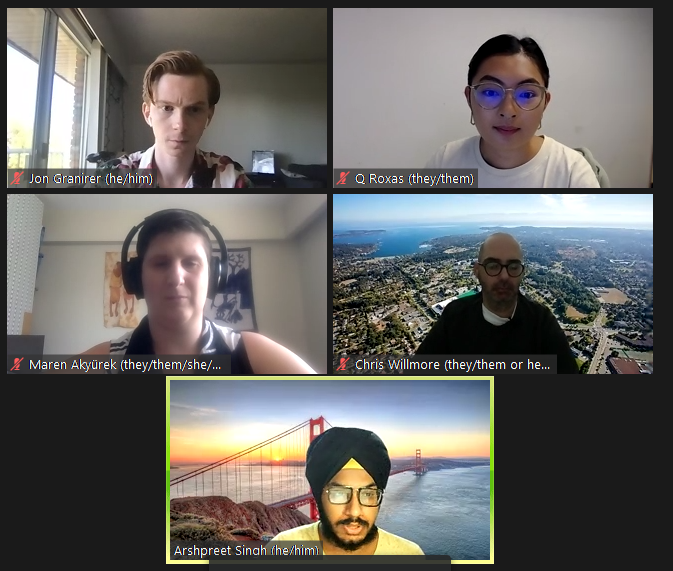SSD campaign advocates for HyFlex course delivery

The #Access4All campaign advocates for disabled, international, or other students who face barriers returning to campus in fall 2021. Within this campaign, on July 14, UVic’s Society for Students with a Disability (SSD) hosted an online discussion about course accessibility.
Six panelists — a UVSS lead director, a UVic faculty member, SSD representatives, and both domestic and international students — shared perspectives with 41 attendees about challenges of resuming in-person instruction. Currently, 88 per cent of course sections are exclusively face-to-face at UVic.
The #Access4All campaign pushes for hybrid flexible, or HyFlex, education to meet accessibility needs. HyFlex involves lectures, labs, and seminars taught in person and online by the same instructor, giving students a daily choice about how to participate.
This campaign has garnered support across UVic, including from the UVSS, the Gender Empowerment Centre, and the Public Health and Social Policy Student Association. The SSD also started a petition calling for equity, accessibility, and justice in education.
Battling travel and health barriers
With on-campus classes just weeks away, the panel discussed travel and health barriers for students with disabilities and those facing international flight restrictions.
Julia Denley, SSD student liaison and #Access4All co-chair, and Maren Akyürek, a UVic student living in Vancouver, recalled past hindrances caused by personal health problems.
“Going to class … felt like a battle with my health issues,” said Denley.
Akyürek agreed that “walking between the bus loop and one of the buildings, [usually] under 10 minutes, [became] a 45-minute walk” when feeling ill.
The panelists said that in-person classes pose a concern for students who thrived in an online learning environment because UVic’s current plan for course delivery may not accommodate everyone’s needs.
According to UVic’s Faculty Association, courses with more than 50 international students may offer online sections — although this may leave gaps for students requiring specific classes.
Arshpreet Singh, UVic international student located in India, described navigating the 12-hour time difference to attend classes in the middle of the night or early morning this past year. He stressed that travel was an insurmountable barrier.
“I have been trying to get to UVic for the past four months,” Singh said.
The Government of Canada extended the suspension on flights from India until September 21, due to rising cases of COVID-19. A report from CIC News indicates that India, with 30 per cent, is Canada’s leading source of international students.
Singh described the mandatory quarantines for unvaccinated international students entering Canada as unreasonably expensive.
“A three-day quarantine at a government-authorized hotel [costs] a student approximately $1 100 to $2 000,” said Singh.
Although the government updated public health measures to end hotel quarantines starting August 9, for those still unable to travel, the #Access4All campaign advocates quality online-learning education within Canada and abroad.
“International students and the students from Canada as well are expecting a lot from [higher] education right now,” Singh stated.
Improving access to online and in-person learning
After speaking on the physical limitations of in-person learning, the panel discussed the nature of in-class learning experiences. Proponents of the HyFlex model — where students choose their daily method of engagement — believe online learning meets accessibility needs.
“Learning does not have to be ephemeral,” said Dr. Chris Willmore, a UVic economics professor with disabilities and painful mobility issues.
Willmore described “ephemeral education” as lectures held in-person that are not recorded and become inaccessible after class ends. The temporary availability of lecture material makes it ephemeral.
Willmore doubts whether quality education must occur in a “you-get-it-or-you-miss-it session,” which often makes it difficult for students with disabilities to participate.
Although some instructors resist posting lecture recordings online, Willmore follows the lead of an able-bodied professor who has posted their audio lectures online for years.
“I started doing that, and I saw a huge drop in class attendance … [and an] increase in learning … because students were able to work in the way they desired.” Online courses ensure that “students have a voice and … a choice” in higher education, expressed Willmore.
Online assessment was another academic concern for attendees. Willmore explained that while proctored exams and lab components work well during in-person classes, open-book assessments or long-term projects are more appropriate for online-only courses. However, marking these projects requires sufficient teaching assistant support, Willmore noted.
At the Let’s Talk about Teaching 2020 event, Dr. Valerie Irvine, founder and co-director of the Technology Integration and Evaluation Research Lab, presented on multi-access learning, and Willmore addressed online assessment strategies.
Recordings of both sessions are accessible on UVic’s Online Academic Community.
Creating inclusive online communities
The panel ended by considering the benefits of inclusive online communities for extracurricular activities and for in-person courses.
As a stay-at-home parent and a primary caregiver living in Vancouver, Akyürek observed that online programming made extracurriculars more accessible, allowing them to feel included in UVic’s community for the first time.
Akyürek also mentioned experiencing internal ableism during in-person group projects and social events, which prompted them to question whether their peers would understand their health concerns.
Online courses and extracurricular events are not the “be-all and end-all for everyone,” said Akyürek, “but for me, it has opened up more opportunities.”
Jonathan Granirer, SSD student liaison and #Access4All co-chair, said that the campaign advocates for students unable to attend in-person classes.
Although in-person classes will return in fall 2021, the #Access4All campaign hopes to advance accessibility at UVic and prevent losing options afforded to disabled and international students.
Q Roxas, the UVSS director of events, concluded, “When we make things more accessible for folks who need it, it is actually more accessible for everyone.”







